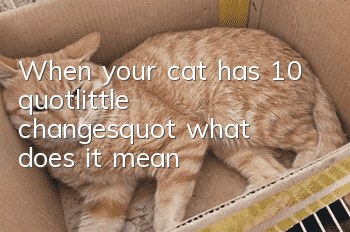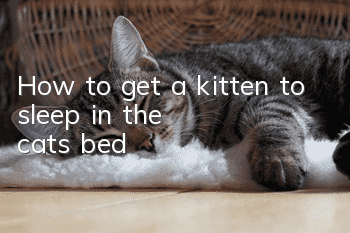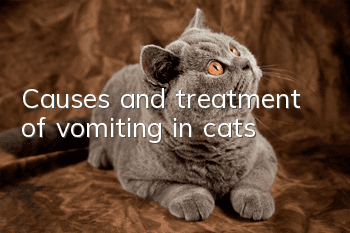When your cat has 10 "little changes", what does it mean?

From the origin of wild cats, a sick cat is easy to be preyed on. Cats are unlikely to tell their owners that they are not feeling well, and they are very good at hiding the signs. Therefore, owners of domestic cats need to seriously fulfill their responsibilities as qualified guardians. Any movement, behavior or attitude that is different from the cat's daily routine is a hint: there may be something wrong with it!
Cat owners usually don’t notice the subtle changes happening in their cats. They only realize the seriousness of the problem when the abnormality is severe enough and the cat has obvious symptoms. In fact, the earlier it is detected, examined and intervened, the greater the chance of successfully solving the problem, and it can also save you the expensive cost of seeing a veterinarian when your cat is seriously ill. The following 10 signs of cats need to be of great concern to cat owners!
1. Decline in spirit and vitality
If your cat suddenly refuses to participate in a previously normal play behavior, or seems listless, unusually lethargic, lethargic, and disinterested in things around him, this is a sign that he is not feeling well.
2. Changes in appetite
If your cat suddenly starts gorging on food, or won't eat, this is a sign of a serious problem. In cats, complete anorexia (not eating) is particularly dangerous and can lead to feline hepatic liposis, a potentially life-threatening liver disease that occurs within 24-48 hours of a cat becoming anorexic, so when her appetite When something goes wrong, you need to quickly investigate the cause.
3. Polydipsia and polyuria
Polydipsia and polyuria in cats is a sign of kidney disease or diabetes. Such as increased urine output, abnormal urination movements and increased frequency, all indicate a precursor to urinary system disease.
4. Changes in behavior
If your cat starts to hide, refuses play, or becomes aggressive for no reason, these changes may be due to a behavioral problem (such as environmental stimulation, frightening, etc.). There are also behavioral changes such as lameness in the limbs, difficulty walking, standing up or lying down, etc., which require your high attention.
5. Vomiting/diarrhea
Occasional vomiting or diarrhea in cats may not cause cat owners to pay attention. This may be caused by irritation of hair bulbs in the stomach, allergies and other reasons. It is transient, but persistent vomiting and diarrhea indicate serious gastrointestinal problems.
6. Refuse to use the cat litter box
If your cat suddenly refuses to use the litter box and urinates elsewhere, ruling out a behavioral or medical problem should be your first step. The reasons why cats urinate elsewhere in the home are as follows:
► Cystitis, micturition reflex disorder and other diseases;
► Aversion to cat litter box, if the cat litter is not cleaned in time, it becomes messyUnbearable and other reasons;
► Cats are afraid to use the litter box because the litter box may be placed in a place where they can easily be disturbed;
► Other cats have used the litter box to go to the toilet or there is a threatening impression of cats near the litter box;
► Newly arrived cats try to mark all the places in the house as their territory.
7. Weight gain or loss
Sudden weight gain or weight loss in your cat is a worrying sign that may indicate an underlying disease and requires consultation with your veterinarian.
8. Matt hair, severe shedding, excessive scratching
and licking and biting behavior
Cats with severe hair loss and dull coat color indicate nutritional problems. Excessive self-scratching and licking behaviors indicate that the cat suffers from allergic, parasitic or fungal skin diseases.
9. Unpleasant body odor (such as mouth, nose, ears, reproductive organs
Abnormal changes in organs and skin)
If your cat’s unpleasant body odor is coming from the mouth, ears, genitals or skin, it could be a sign that your cat may have dental disease, infection, skin disease or something more serious (such as kidney failure).
10. Changes in vocalization
If your cat’s vocalization pattern is abnormal, such as a previously quiet cat becoming a meowing cat, or a previously meowing cat becoming quieter, this is worthy of attention from cat lovers.
In short, don’t ignore any subtle changes in your cat. Consider making an appointment with your veterinarian at a time that is convenient for you to help you address any unusual signs you notice. When your cat has the above 10 abnormal changes, it means that it is oppressed or sick, and cat owners need to pay close attention to it!
Recommended Good Things
Aineng Pet Odor Eliminating Disinfectant can effectively remove body odor/feces odor and other odor molecules! Effectively treats skin diseases caused byfungi/bacteria! Can killparvovirus/canine distemper virus/coronavirusetc.!
It is edible grade for pets, does not contain fragrances, does not contain chemicals, can be sprayed directly, and is harmless to human pets!
Consultation:13028809308 (WeChat synchronization)
Scan the QR code on WeChat to enter the purchase
- Do cats need to be beaten every year?
- What should you pay attention to when you first bring a kitten home?
- Cat otitis externa symptoms and treatment
- How often do pre-month-old kittens defecate?
- What should I do if my cat doesn’t eat or drink?
- What causes domestic cats to vomit and not eat?
- How to deal with symptoms of miscarriage in cats
- Why can’t cats eat shrimp shells?
- Does a cat recognize its owner when it grows older?
- Can I eat rice noodles after being scratched by a cat?



